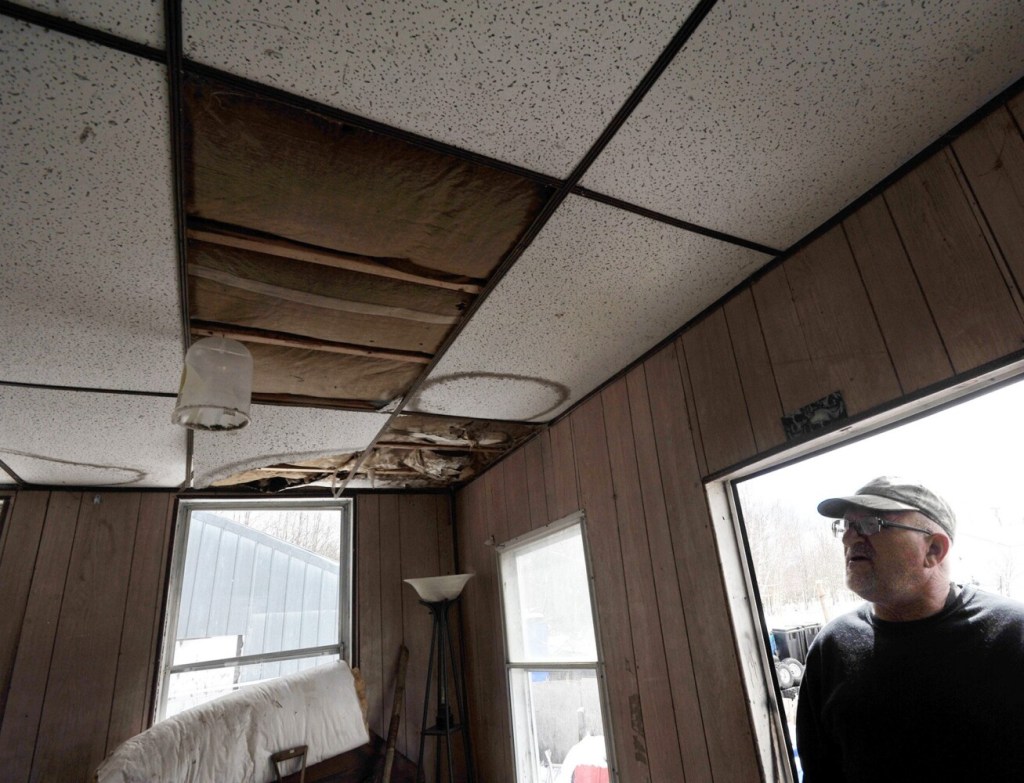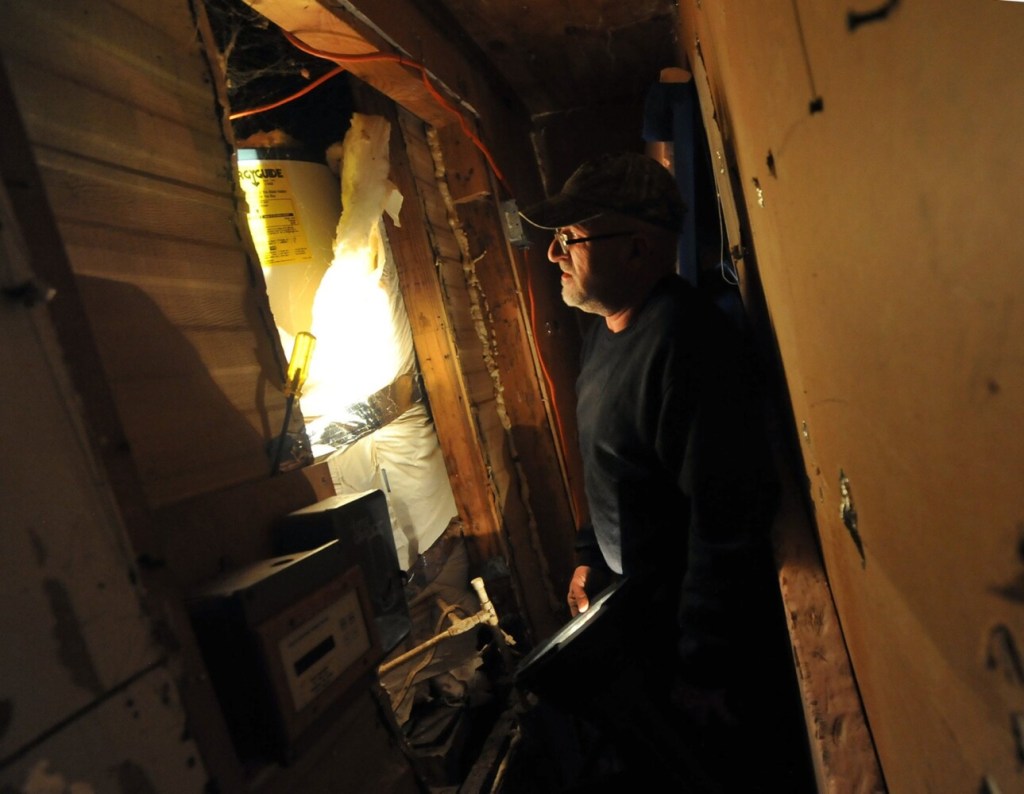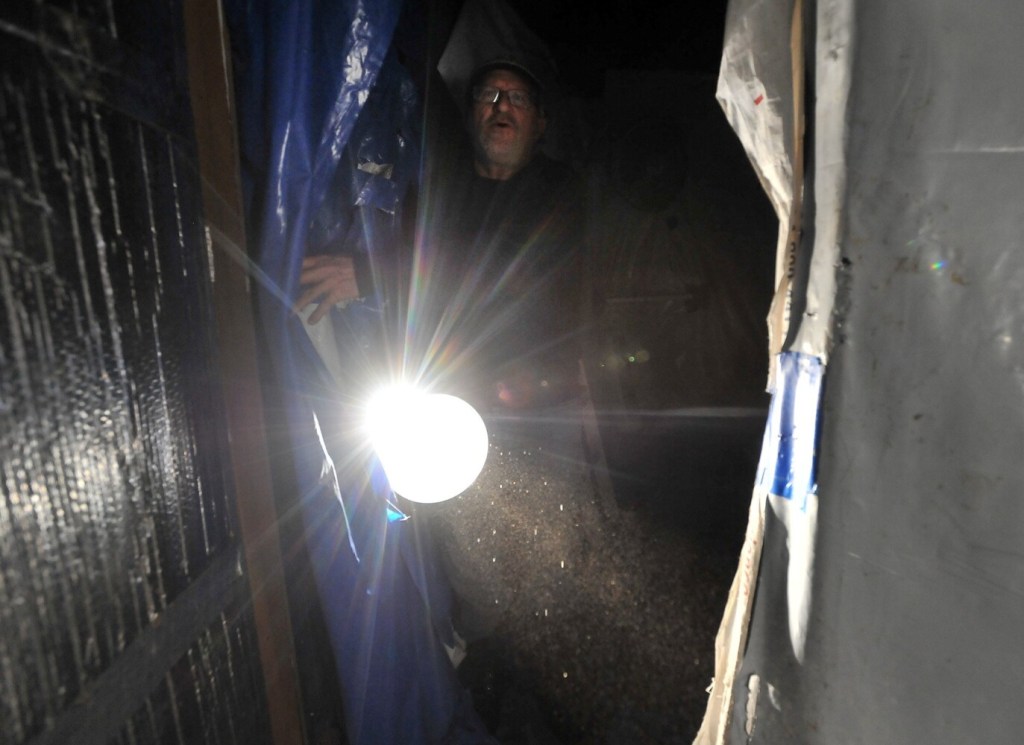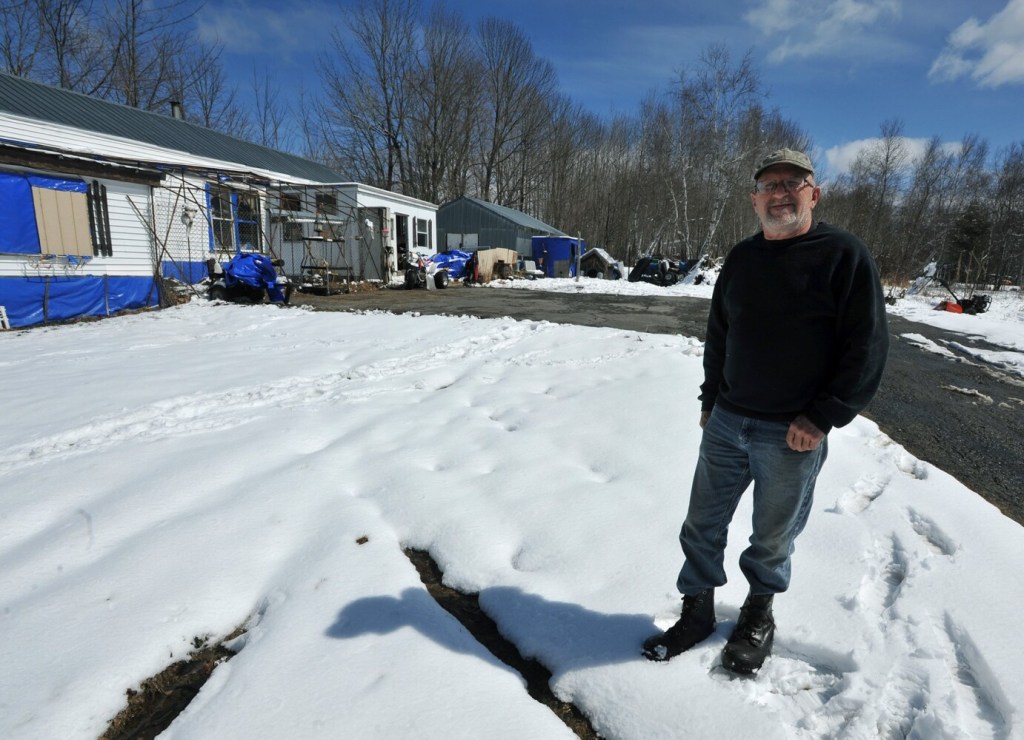Doug Handy of Oakland is petrified at the thought of having to search for a place to live during the coronavirus pandemic since receiving a 30-day eviction notice from his landlord March 25.
“She told me I have to be out by April 25,” Handy, 58, said. “We’ve been here 11 years. When we first moved in, she said she would sell the mobile home to us. I never missed a rent payment.”
Handy, who is legally blind, said he never got the promise in writing that he could buy the home, as he trusted his landlord. He lives in a 1979 Champion mobile home on North Gage Road in Oakland with his partner, Evelyn Goodale, 60.
His landlord, Linda Martin, said she never told Handy when he moved in that he would be able to buy the mobile home, which is in bad shape and needs to be demolished. She said she told him last August that he needed to find another place to live, but he has taken no steps to do so.
“It’s not about him, per se,” Martin said. “He’s been a good tenant. It’s just that that home should come down before it falls down. I thought that would give him plenty of time that he could find a place, but to my knowledge, he has not attempted to.”
Nothing prevents a landlord from issuing a tenant a notice to quit during the pandemic, and in some situations, landlords are informing tenants their leases will not be renewed, while some rental homes are being put up for sale. Maine’s courts stopped hearing new eviction cases March 13 because of the coronavirus crisis, but they are still issuing writs of possession, the legal documents that let landlords kick out tenants, from cases heard before that date. Tenants have a right to a hearing and mediation can take place which adds to the length of the process.
Martin, asked if she would consider delaying eviction in the face of the coronavirus pandemic, said she started the process because she knows evictions take a long time and now, with the pandemic, it will take longer.
“I’m just concerned about the condition of that trailer,” she said. “It’s not something I’d live in.”

Doug Handy uses a flashlight to illuminate a malfunctioning water heater Tuesday in the lower level of his home in Oakland. The water heater has tipped and water is falling through the floor, according to Handy. Morning Sentinel photo by Rich Abrahamson Buy this Photo
Handy said he and his partner, who works in a kitchen at a long-term care facility, have paid about $65,000 in rent over the years, not to mention thousands of dollars to replace floors and windows and make other repairs. Now their hot water heater doesn’t work properly and whenever he needs to heat water, he has to go to the other end of the trailer to turn on a switch and then turn it off again.
“The hot water heater is going through the floor and making bad noises,” he said.
Handy said that, after years of believing he would be able to buy the mobile home, he was blindsided when Martin told him she wanted to demolish the home and give the land to her daughter for a wedding gift.
Martin maintains, however, that she did tell Handy she wanted to give the property to her daughter, but only after she gave Handy plenty of time to find another home.
Meanwhile, Handy asked for help from Pine Tree Legal Assistance, an organization that seeks to ensure state and federal laws affecting poor people are upheld. Pine Tree also addresses systemic barriers to justice that Mainers with low income often face.
Hillary Knight, an attorney for Pine Tree, explained that the courts are not addressing eviction cases during the coronavirus pandemic, having issued an order saying they are closed until at least May 1 except for emergency cases. She said she could not discuss the details of Handy’s case, but did describe how the eviction process works in “normal times” when a national emergency is not occurring.
In general, a landlord asks a tenant to move out for a variety of reasons, such as a lease violation or wanting to sell a house, and may first issue the tenant a notice to quit. There is nothing preventing a landlord from issuing such a notice now, during the pandemic, she said.
The tenant has a right to a hearing and a mediation may take place in which more time might be allowed for the tenant to move out. Both sides, according to Knight, have an incentive to work together to find a solution. When an eviction trial court makes a judgment in a landlord’s favor, a tenant has only nine days in which to leave the premises. A landlord could go to the court and get a writ of possession; if the landlord wins, and a sheriff’s official could serve the writ to the tenant, requiring the tenant to leave within 48 hours.
Sheriff’s departments now are making decisions about what to serve or not serve during the pandemic, according to Knight. A sheriff could decide not to serve a writ of possession, for instance, she said.
A hearing for Handy could occur at the beginning of May and there is always the possibility of reaching a settlement with the landlord, according to Knight.
“In Mr. Handy’s case, and in all cases, it’s good to do everything you can to reach a practical solution and that is very important right now,” she said. “I think it’s extremely important that we absolutely avoid anybody being homeless or being without housing right now. I think everyone should be staying in their homes and have the absolute right to due process and hearing.”
Knight emphasized that it is not safe to go out during the pandemic, and it would be dangerous for anyone to try to look for housing.
“For me, as an attorney, keeping my clients housed and safe and able to stay home is the most important thing,” she said.

Doug Handy near where he feeds birds Tuesday in front of his Oakland home. Handy shares the home with his partner Evelyn Goodale and dogs Bear Bear and Chrissy. Handy, who is legally blind, has lived in the home for 11 years. The family is being evicted, though the processing of eviction paperwork is held up because of coronavirus. Morning Sentinel photo by Rich Abrahamson Buy this Photo
Oakland’s code enforcement officer, David Savage, said in a phone interview that he became aware of the situation a few days ago, but there is not much he can do, as it is a civil matter between tenant and landlord.
Savage did address the water heater problem, however, and said Martin told him she would have it fixed. Martin said in the phone interview that she planned to send someone to the mobile home to replace the pressure switch. Handy said late Wednesday afternoon that it had not yet been replaced.
Handy also said Martin at one point encouraged him to go to the bank to get a loan for $32,000 and told him that by April, the home would be his.
Martin said he did go to the bank, but could not come up with money for a down payment. Handy denies that, saying he could come up with a down payment, as he has assets he could sell, including a four-wheeler.
Money, however, is tight, he acknowledged. He said that, in addition to paying $500 monthly to rent the home and garage, he and his wife pay $170 every two weeks for a cab to take her to and from work. The coronavirus pandemic has made the situation even more stressful.
“Our life is on such a balance,” he said. “We’re like a lot of other people, I’m sure, who are hanging on with our fingernails and all it’s going to take is a little bump. The world is so hard, even for people that are trying.”
He said he is devastated to think about having to leave his home, where he tends organic gardens in the summer and grows tomatoes, sunflowers and other plants.
Send questions/comments to the editors.










Success. Please wait for the page to reload. If the page does not reload within 5 seconds, please refresh the page.
Enter your email and password to access comments.
Hi, to comment on stories you must . This profile is in addition to your subscription and website login.
Already have a commenting profile? .
Invalid username/password.
Please check your email to confirm and complete your registration.
Only subscribers are eligible to post comments. Please subscribe or login first for digital access. Here’s why.
Use the form below to reset your password. When you've submitted your account email, we will send an email with a reset code.